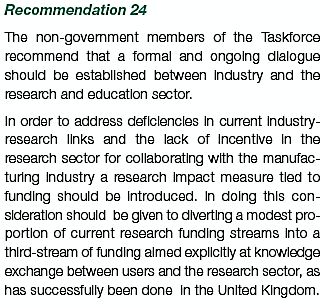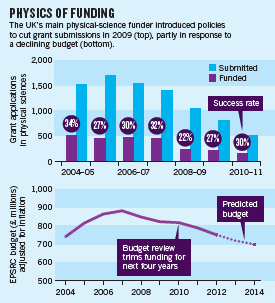|
News & Views item - August 2012 |
![]() Matters of Relevance, Questions of Impact. (August 27, 2012)
Matters of Relevance, Questions of Impact. (August 27, 2012)
The panel on the left is taken from the Australian
Report of the Non-Government Members![]() of the Prime Minister's Manufacturing Taskforce while the graphic on the right
is Nature's* rendition of data from the UK's Engineering and Physical
Sciences Research Council (EPSRC).
of the Prime Minister's Manufacturing Taskforce while the graphic on the right
is Nature's* rendition of data from the UK's Engineering and Physical
Sciences Research Council (EPSRC).


The UK's physical scientists see what EPSRC, "the government body that holds the biggest public purse for physics, mathematics and engineering research in the United Kingdom", has embarked on are drastic funding cuts aimed at discouraging resubmissions and in certain cases temporarily blocking people whom they considered to have submitted too many unsuccessful applications. A second set of reforms include requirements for grant applicants to explain how their research might generate economic or other benefits, i.e. impact.
As Nature's Ananyo Bhattacharya reported it: "The changes incensed many physical scientists, who protested that the policy to blacklist grant applicants was draconian. They complained that the EPSRC's decision to exert more control over the fields it funds risked sidelining peer review and would favour short-term, applied research over curiosity-driven, blue-skies work in a way that would be detrimental to British science." In fact the matter brought forth a letter to The Daily Telegraph in support -- nine UK and US Nobel laureates accused EPSRC of "manipulating the process of peer review" and "establishing favouritism schemes". In November last year, EPSRC began requiring a "national importance" criterion. Researchers must now describe "the extent to which the research proposed has the potential, over 10–50 years, to meet national strategic needs".
Postdoctoral mathematician Will Merry at the University of Cambridge told Nature: "It's very hard to justify the economic importance of work that might not become applicable to real-world problems for decades." And of immediate consequence to him the EPSRC has determined that in future postdocs and other fellowships in mathematics would be funded only in statistics and applied probability. As a result "Merry, who finished a 12-month EPSRC doctoral-prize fellowship will start his postdoc at ETH, Zurich next month, and he told Nature that all the maths PhD students he knows at the University of Cambridge are following a similar path. He says, "The most visible outcome of the change in funding is that to the best of my knowledge they're all going abroad next year."
In the opinion of Cambridge cosmologist and former president of the Royal Society, Martin Rees, the new requirements could affect how young researchers apply for their first grant. "It's going to make them slant their application in a way that might not be optimal from the point of view of the research," he says. The council should focus on making sure that the "brightest people don't get discouraged", adds Rees, who says he finds the idea of asking researchers to write about the potential future national importance of their work "absurd".
Paul Clarke, a synthetic organic chemist at the University of York, and one of the EPSRC's most vociferous critics told Nature that in 2010–11, EPSRC funded 151 proposals in the physical sciences, excluding engineering, down from more than 500 in 2004–05. Yet there are more than 3,000 scientists in the United Kingdom who are eligible to apply for EPSRC funding: "People would rather not submit than submit, get blacklisted and hence be seen as a failing academic by their department. There is now a culture of fear in academic departments."
_____________________________________
Here we're reminded, rather wistfully, of the observation Robert Wilson made to a Joint Congressional Committee on Atomic Energy in 1969 when he was asked to justify the continuation of the US$250 million-dollar request to fund the building of the Fermi National Accelerator Laboratory. (At that time Richard Nixon was President, both houses of Congress were Democratic.)
Professor Wilson emphasized that it had nothing at all to do with national security, rather:
It has only to do with the respect with which we regard one another, the dignity of men, our love of culture. It has to do with: Are we good painters, good sculptors, great poets? I mean all the things we really venerate in our country and are patriotic about. It has nothing to do directly with defending our country except to make it worth defending.
Fermilab got its funding and to this day it continues its basic research in particle physics..
______________________________
*Nature VOL 488 | 2 AUGUST 2012, P21